
Archaic Greece:
History According to the Storytellers
The Death of Patroklos from Pope, Iliad of Homer
With no first-hand written documents of their past, survivors turned to traditional storytellers.
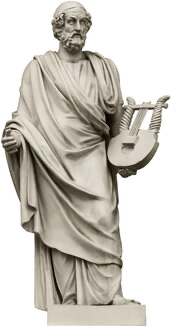
Although we know little about this time, we know a great deal more than the Greeks did. But this, in a sense, left the Greek survivors free from the constraints of evidentiary history, to turn instead to the world of their traditional storytellers.
From about 1000 BCE onwards, wandering poets sang cycles of formulaic, heroic tales, sometimes with subtle changes to suit specific situations. These oral recitations would entertain communities, in particular the wealthiest people. They were so long that they would take days to complete. They created a world connecting the Greeks to an heroic past and became the center of their cultural tradition. The Greeks had no sacred text, but for them, these epics took on a stature equivalent to it. The epic poems of Homer were among the first things they wrote down around 725 BCE.
These Homeric poems became the basis of moral behavior and were taught to young men throughout Greece. This was their heroic past. These mytho-poetic stories finally became much more for the Greeks than just a history, they embodied who they were. Children were taught Homer, not history, and so through myth, memory and poetry the Greeks created a unique identity and culture. They told of heroes who were twice as strong, powerful and steadfast as any normal person and this ideal became the foundation on which a Greek man would base himself. These epics established a code of honor based on shame—where valor and the adherence to duty in the face of overwhelming odds were all important. Heroism is all the greater because a Greek will fight until the end; even though he loses, he will not lose his honor: “If I stay and die Sparta loses nothing, if I run away and live, both Sparta and I will be dishonored.”
Children were taught Homer, not history, and so through myth, memory and poetry the Greeks created a unique identity and culture.
The two extant Homeric epics (there were originally ten) both concern the great defining moment of Greek culture, the Trojan War. Whether or not this war really took place, or occurred as the Greeks narrate it, we don’t know. A war did take place at the time around a city that quite likely was Troy, and that city was utterly destroyed, but beyond that, we know little. Nevertheless, we know that the Greeks saw the Trojan War as the first moment in history when they came together as one people with a common purpose. This unification, myth or not, gave the later Greeks a sense of national and cultural identity. If you spoke Greek and had the same epic values, it meant that you were the same as all the other Greek-speaking peoples.
To these early Greeks, actions were of paramount importance. The world was a place of conflict and difficulty where human value and meaning were measured by effective action.
There are two very important words repeatedly used throughout the Homeric epics: honor (timé) and virtue or greatness (areté). The latter term is perhaps the most reiterated cultural and moral value in ancient Greece and means something like achieving, morally and otherwise, your greatest potential as a human being. The reward for great honor and virtue is fame (kleos), which is what guarantees meaning and value to one’s life. Dying without fame (akleos) is generally considered a disaster, and the warriors of the Homeric epics commit the most outrageous deeds to avoid dying in obscurity or infamy (witness Odysseus’s absurd insistence on telling Polyphemos his name even though this will bring disaster on him and his men).
As we shall see as we move to explore Greece in the Axial Age, the corpus of myths concerned with gods, heroes, and rituals embodied the worldview of Greek religion and remained its legacy, one that is still with us today. As with all traditional stories, their myths were revised and reshaped to ensure relevance to their audience. For example, a Greek tragedian might alter a myth by changing not only the role played by the gods in it but also the evaluation of the gods’ actions.
Greek Political Life
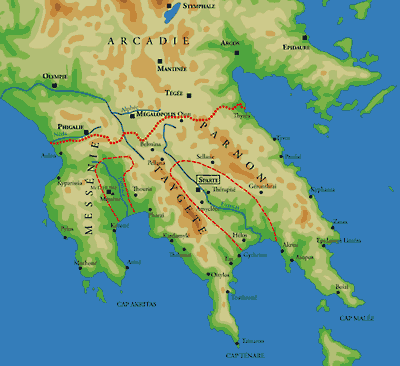
From the eighth century, political development focused around two entities. First, the older tribal-state or ethnos, established mostly in mainland Greece, consisted of agricultural villages and settlements united by a common religious temple or site and governed by a major landowner or by a king (basileus). Second, what became known as the city-state or polis evolved around hilltop centers (acropolis) that were at some time in their history dedicated to specific gods. Every ethnos or polis was a politically separate and independent entity, frequently experiencing internal strife, disunity, and in constant conflict with those around it.
Greek Government
The most common form of government in the polis was oligarchy, or “rule by a few.” The oligarchs were almost always drawn from the noble classes or from the wealthiest citizens of the state, but a variety of oligarchic forms were invented in the eighth century. These included having the members chosen by lot, having them elected, or rotating the oligarchy among members of a certain class. The oligarchs most often ruled absolutely and had many of the powers granted to a king.
Fifth century BCE Greece was one of four world regions where great Axial age thinkers began to forge a more enlightened morality of personal responsibility.
Each city-state attempted to handle this statis in its own way. The most extreme was Sparta. In wars that resulted in the conquest and enslavement of the Messenians in 650–600 BCE, the Spartans alone of the ancient Greeks took a land and peoples by force. Such an act had no precedent in the ancient Greek world. Spartan life became rigid and conservative; Spartans lived in constant fear of their captured neighbors who became subjugated ‘helots,’ farming and laboring for their Spartan masters. Every Spartan male citizen became a soldier of the Spartan army. Even the elite were obliged to live and train as soldiers, which at least diffused any conflict between rich and poor. In contrast, Athens united the entire region of Attica under its rule and made all its subjects Athenian citizens.
The Hoplites and Free Speech
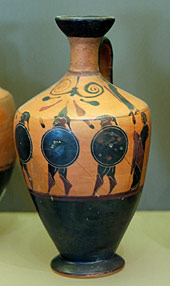
From 650–350 BCE, city-states relied on ordinary citizens to fight when necessary. They were expected to equip themselves and since swords, shields and armor were quite expensive, this likely applied only to the relatively successful farmer or craftsman. Most would join the hoplite infantry, an experience which helped to transform the hierarchical structure of Greek society.
When farmers fought alongside noblemen in a hoplite phalanx, they were transformed into one savage killing machine. They were equals, all totally dependent upon each other for their safety and success in battle. After such experiences, farmers no longer saw themselves as separate and subservient. They were all noble warriors and would soon demand their rights as citizens, forcing the pace towards eventual democracy.
In the late seventh century, free speech, originally the privilege of the nobles, became the right of all hoplite soldiers. All hoplites were permitted to challenge the battle plan and contribute practical solutions. They spoke in practical, logical and solution-oriented terms, a language called Logos that was quite different from that used in mythical and poetic oratory.
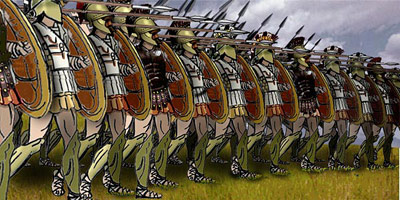
External Stories and Videos
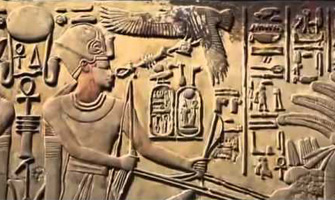

Secrets of the Aegean Apocalypse
The History Channel
Around 1200 BC, an ancient Armageddon destroyed nearly every known civilization. What could have caused it? The theories are many, but most now include one mysterious and massively destructive factor—a force only the Egyptians survived to name: The Sea People.
